THE ONLINE TUTOR
I will take you through your esteemed course and make sure you pass with flying colors. A and B are the only grades available for my students. Follow for the best services treated with a lot of caution. Kindly leave a review after purchasing any of the documents so as to improve the quality of assignments offered. Client satisfaction is our number one priority.
- 39
- 0
- 1
Community
- Followers
- Following
40 items
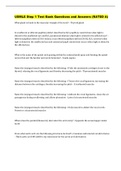
USMLE Step 1 Test Bank Questions and Answers (RATED A)
What gland is found in the muscular triangle of the neck? - Thyroid gland Is an afferent or efferent pupillary defect described as B/L pupillary constriction when light is shined in the unaffected eye and B/L paradoxical dilation when light is shined in the affected eye? - Afferent pupillary defect (CN II lesion); in an efferent pupillary defect (CN III), B/L constrict when light is shined in the unaffected eye and consentual pupil constriction occurs when light is shined in the affected ey...
- Package deal
- Exam (elaborations)
- • 368 pages •
What gland is found in the muscular triangle of the neck? - Thyroid gland Is an afferent or efferent pupillary defect described as B/L pupillary constriction when light is shined in the unaffected eye and B/L paradoxical dilation when light is shined in the affected eye? - Afferent pupillary defect (CN II lesion); in an efferent pupillary defect (CN III), B/L constrict when light is shined in the unaffected eye and consentual pupil constriction occurs when light is shined in the affected ey...
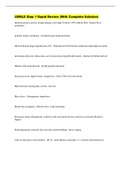
USMLE Step 1 Rapid Review (With Complete Solution)
Abdominal pain, ascites, hepatomegaly, (also high D dimer, CHF without JVD) - Budd-Chiari syndrome Achilles tendon xanthoma - Familial hypercholesterolemia Adrenal hemorrhage, hypotension, DIC - Waterhouse-Friderichsen syndrome (meningococcemia) Arachnodactyly, lens dislocation, aortic dissection, hyperflexible joints - Marfan's (fibrillin defect) Athlete with polycythemia - Erythropoietin injection Back pain, fever, night sweats, weight loss - Pott's (TB to the vertebrae) Bilateral hil...
- Package deal
- Exam (elaborations)
- • 19 pages •
Abdominal pain, ascites, hepatomegaly, (also high D dimer, CHF without JVD) - Budd-Chiari syndrome Achilles tendon xanthoma - Familial hypercholesterolemia Adrenal hemorrhage, hypotension, DIC - Waterhouse-Friderichsen syndrome (meningococcemia) Arachnodactyly, lens dislocation, aortic dissection, hyperflexible joints - Marfan's (fibrillin defect) Athlete with polycythemia - Erythropoietin injection Back pain, fever, night sweats, weight loss - Pott's (TB to the vertebrae) Bilateral hil...
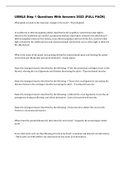
USMLE Step 1 Questions With Answers 2022 (FULL PACK)
What gland is found in the muscular triangle of the neck? - Thyroid gland Is an afferent or efferent pupillary defect described as B/L pupillary constriction when light is shined in the unaffected eye and B/L paradoxical dilation when light is shined in the affected eye? - Afferent pupillary defect (CN II lesion); in an efferent pupillary defect (CN III), B/L constrict when light is shined in the unaffected eye and consentual pupil constriction occurs when light is shined in the affected ey...
- Package deal
- Exam (elaborations)
- • 368 pages •
What gland is found in the muscular triangle of the neck? - Thyroid gland Is an afferent or efferent pupillary defect described as B/L pupillary constriction when light is shined in the unaffected eye and B/L paradoxical dilation when light is shined in the affected eye? - Afferent pupillary defect (CN II lesion); in an efferent pupillary defect (CN III), B/L constrict when light is shined in the unaffected eye and consentual pupil constriction occurs when light is shined in the affected ey...
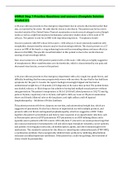
USMLE Step 1 Practice Questions and answers (Complete Solution Graded A+)
A 38-year-old man presents to the emergency department due to seizures that started earlier that day, as reported by his sister. He adds that his vision is also blurry. The patient says he has never traveled outside of the United States. Physical examination reveals several enlarged cervical lymph nodes as well as a right homonymous hemianopia. Laboratory studies show a CD4 count of 78 cells/μL. The patient is sent for an MRI with ring-enhancing lesion. - Toxoplasma Gondii Occurs in patien...
- Package deal
- Exam (elaborations)
- • 3 pages •
A 38-year-old man presents to the emergency department due to seizures that started earlier that day, as reported by his sister. He adds that his vision is also blurry. The patient says he has never traveled outside of the United States. Physical examination reveals several enlarged cervical lymph nodes as well as a right homonymous hemianopia. Laboratory studies show a CD4 count of 78 cells/μL. The patient is sent for an MRI with ring-enhancing lesion. - Toxoplasma Gondii Occurs in patien...
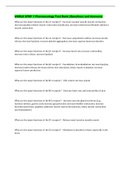
USMLE STEP 1 Pharmacology Test Bank (Questions and Answers)
What are the major functions of the α1 receptor? - Increase vascular smooth muscle contraction, increase pupillary dilator muscle contraction (mydriasis), increase intestinal and bladder sphincter muscle contraction What are the major functions of the α2 receptor? - Decrease sympathetic outflow, decrease insulin release, decrease lipolysis, increase platelet aggregation, decrease aqueous humor production What are the major functions of the β1 receptor? - Increase heart rate, increase con...
- Package deal
- Exam (elaborations)
- • 113 pages •
What are the major functions of the α1 receptor? - Increase vascular smooth muscle contraction, increase pupillary dilator muscle contraction (mydriasis), increase intestinal and bladder sphincter muscle contraction What are the major functions of the α2 receptor? - Decrease sympathetic outflow, decrease insulin release, decrease lipolysis, increase platelet aggregation, decrease aqueous humor production What are the major functions of the β1 receptor? - Increase heart rate, increase con...
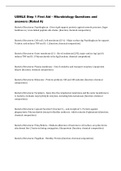
USMLE Step 1 First Aid GÇô Microbiology Questions and answers (Rated A)
Bacterial Structures: Peptidoglycan - Gives rigid support, protects against osmotic pressure; Sugar backbone w/ cross-linked peptide side chains. (function; chemical composition) Bacterial Structures: Cell wall / cell membrane (G+'s) - Major surface Ag; Peptidoglycan for support. Teichoic acid induces TNF and IL-1. (function; chemical composition) Bacterial Structures: Outer membrane (G-) - Site of endotoxin (LPS), major surface Ag; Lipid A induces TNF and IL-1 Polysaccharide is the Ag (fu...
- Package deal
- Exam (elaborations)
- • 88 pages •
Bacterial Structures: Peptidoglycan - Gives rigid support, protects against osmotic pressure; Sugar backbone w/ cross-linked peptide side chains. (function; chemical composition) Bacterial Structures: Cell wall / cell membrane (G+'s) - Major surface Ag; Peptidoglycan for support. Teichoic acid induces TNF and IL-1. (function; chemical composition) Bacterial Structures: Outer membrane (G-) - Site of endotoxin (LPS), major surface Ag; Lipid A induces TNF and IL-1 Polysaccharide is the Ag (fu...
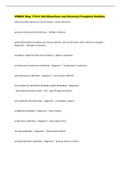
USMLE Step 1 First Aid (Questions and Answers) Complete Solution)
often precedes squamous cell carcinoma - actinic keratosis primary adrenocortical deficiency - Addison's disease polyostotic fibrous dysplasia, precocious puberty, cafe-au-lait spots, short stature, young girls - diagnosis? - Albright's syndrome hereditary nephritis with nerve deafness - Alport's syndrome anti-basement membrane antibodies - diagnosis? - Goodpasture's syndrome anticentromere antibodies - diagnosis? - scleroderma (CREST) anti-double-stranded DNA antibodies (ANA antibodi...
- Package deal
- Exam (elaborations)
- • 189 pages •
often precedes squamous cell carcinoma - actinic keratosis primary adrenocortical deficiency - Addison's disease polyostotic fibrous dysplasia, precocious puberty, cafe-au-lait spots, short stature, young girls - diagnosis? - Albright's syndrome hereditary nephritis with nerve deafness - Alport's syndrome anti-basement membrane antibodies - diagnosis? - Goodpasture's syndrome anticentromere antibodies - diagnosis? - scleroderma (CREST) anti-double-stranded DNA antibodies (ANA antibodi...
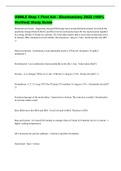
USMLE Step 1 First Aid - Biochemistry 2022 (100% Verified)
Chromatin structure - Negatively charged DNA loops twice around histone octamer (2 each of the positively charged H2A, H2B, H3, and H4) to form nucleosome bead. H1 ties nucleosomes together in a string. (Think of "beads on a string"; H1 is the only histone that is not in the nucleosome core.) In mitosis, DNA condenses to form mitotic chromosomes. <img src="66a - Euchramatin strxr.JPG" /> Heterochromatin - Condensed, transcriptionally inactive ("H eteroC hromatin = H ighly C onde...
- Package deal
- Exam (elaborations)
- • 61 pages •
Chromatin structure - Negatively charged DNA loops twice around histone octamer (2 each of the positively charged H2A, H2B, H3, and H4) to form nucleosome bead. H1 ties nucleosomes together in a string. (Think of "beads on a string"; H1 is the only histone that is not in the nucleosome core.) In mitosis, DNA condenses to form mitotic chromosomes. <img src="66a - Euchramatin strxr.JPG" /> Heterochromatin - Condensed, transcriptionally inactive ("H eteroC hromatin = H ighly C onde...
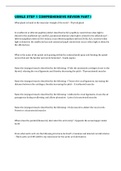
USMLE STEP 1 COMPREHENSIVE REVIEW PART I
What gland is found in the muscular triangle of the neck? - Thyroid gland Is an afferent or efferent pupillary defect described as B/L pupillary constriction when light is shined in the unaffected eye and B/L paradoxical dilation when light is shined in the affected eye? - Afferent pupillary defect (CN II lesion); in an efferent pupillary defect (CN III), B/L constrict when light is shined in the unaffected eye and consentual pupil constriction occurs when light is shined in the affected ey...
- Package deal
- Exam (elaborations)
- • 185 pages •
What gland is found in the muscular triangle of the neck? - Thyroid gland Is an afferent or efferent pupillary defect described as B/L pupillary constriction when light is shined in the unaffected eye and B/L paradoxical dilation when light is shined in the affected eye? - Afferent pupillary defect (CN II lesion); in an efferent pupillary defect (CN III), B/L constrict when light is shined in the unaffected eye and consentual pupil constriction occurs when light is shined in the affected ey...
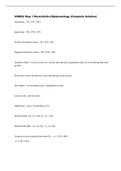
USMLE Step 1 Biostatistics-Epidemiology (Complete Solution)
Sensitivity - TP / (TP + FN) Specificity - TN / (TN + TP) Positive Predictive Value - TP / (TP + FP) Negative Predictive Value - TN / (FN + TN) Incidence Rate - # of new cases in a certain time period / population that is at risk during that time period This looks at new incidences occurring during a time period Prevalence - # of existing cases / population at risk Looks at ALL current cases Odds Ratio - (a/c) / (b/d) OR ad / bc Relative Risk - [a / (a + b)] / [c / (c + d)] Attributab...
- Package deal
- Exam (elaborations)
- • 5 pages •
Sensitivity - TP / (TP + FN) Specificity - TN / (TN + TP) Positive Predictive Value - TP / (TP + FP) Negative Predictive Value - TN / (FN + TN) Incidence Rate - # of new cases in a certain time period / population that is at risk during that time period This looks at new incidences occurring during a time period Prevalence - # of existing cases / population at risk Looks at ALL current cases Odds Ratio - (a/c) / (b/d) OR ad / bc Relative Risk - [a / (a + b)] / [c / (c + d)] Attributab...
